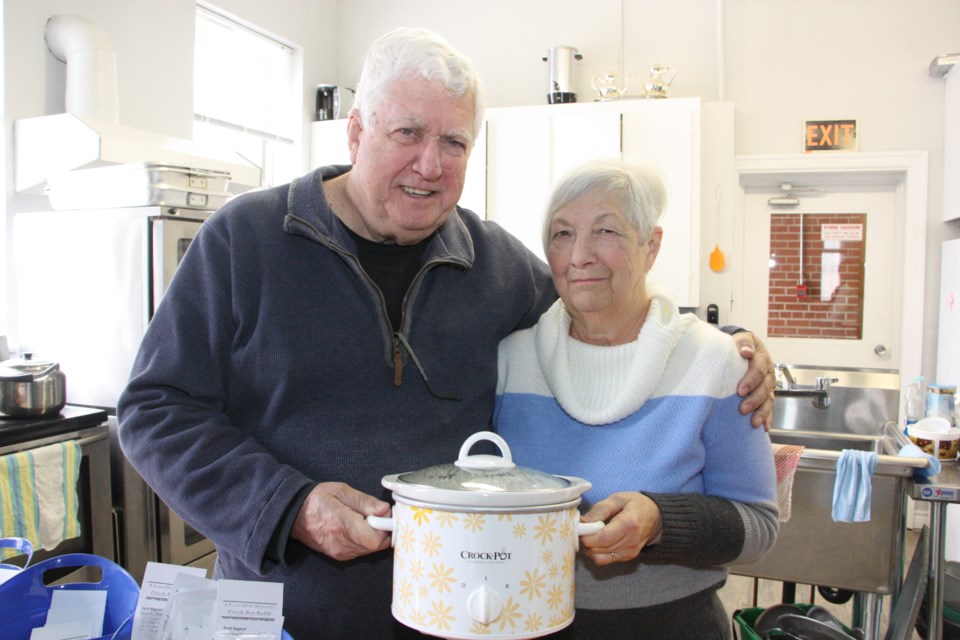A new program in town is slowly cooking up a plan to help people living in rooming houses or other accommodation where they have no access to a kitchen.
Former teachers, led by a food scientist, are bringing back an old staple for a one-pot solution to cooking without a stove or oven.
It’s the Crock-Pot, and it comes with lessons.
Barb Sneyd, a food science graduate from the University of Toronto, worked with other former teachers and members of Trinity United Church in Collingwood to create the Susan Wells Crock-Pot program. Susan Wells was a member of the church, but she was killed about eight years ago while visiting Africa on a mission to an orphanage.
“We wanted to commemorate her work,” said Ralph Sneyd, Barb’s husband and a volunteer at the Crock-Pot program. “She had a really giving heart.”
Barb got the idea after seeing a TV spot on a Catholic church doing something similar for seniors in their congregation. She decided to tailor it to fit the need she saw. She’s been volunteering for the Trinity United Church Community dinner once a month for several years, and through her work there, she learned there were many people in the community living in places where they couldn’t cook for themselves.
“It’s an eye-opener for me to talk with them,” said Barb, adding she wanted to help with a plan that was more long-term than a once-a-month dinner or a food bank.
The program allows those living without a kitchen to attend a class, receive a Crock-Pot and learn one recipe per class they can make in their pot. After that, it’s the simple matter of bringing it home, plugging it into a normal electrical outlet and waiting while their dinner simmers.
“It looks to solve a problem for someone who is stuck in a room with no cooking facilities,” said Ralph.
According to the Sneyds, there are rental facilities, rooming houses in particular, where individuals may rent a room, but there is no kitchen facility in the building. Often the tenants are required to vacate the building between 10 a.m. and 4 p.m.
Barb said there are “too many” people living in rooms like this in Collingwood.
Since starting her class in February, she’s had one woman who had never prepared an onion before. A couple of men who attend the classes were recently widowed and relied on their wives to cook for them.
Each person who attends the classes is given a new 2.5 quart Crock-Pot (a good size for preparing about two to three meals for a single person), and a custom-made food grade cutting board. So far, there are about 30 signed up for monthly classes.
"Crock-Pots are not in fashion anymore, but they are safe and they don't use a lot of hydro," said Barb. "And they're easy."
She raised five teenagers, and often used a Crock-Pot while she was working to make sure there was a big dinner ready to eat when everyone got home.
In the fall and winter, Barb is switching the format to a six-week program with weekly classes.
Ralph added an extra touch by compiling small packs of dry spices measured out per recipe to be given out to those who take the class. He figured dry spices were expensive and not necessarily in everyone’s cupboard.
Barb used her experience and education to pare down some recipes for the smaller sized pot and individual portions.
“I worked on scaling the recipes using ingredients they can get,” said Barb, adding there have been some failed attempts along the way.
Eventually, she wants to put together a cookbook, but she doesn’t have enough recipes yet.
Volunteers have found plenty of space and the right facilities in the back kitchen and hall of the Trinity United Church, which is also the location of a monthly community dinner.
Earlier this week, the Retired Teachers Association regional and local chapter stopped by the program to deliver a $1,500 donation to help fund the program costs. The classes are free to those who sign up, and they include some training on shopping smart and taking advantage of programs such as the Good Food Box.
If you’re interested in signing up for a class, or donating funds to the Susan Wells Crock-Pot program, you can contact Barb Sneyd by email here, or by phone at 705-445-0268.
